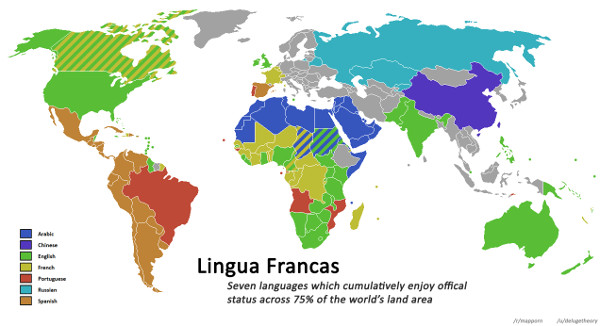These are the most important languages to know for world travel.
 Published on July 20, 2015
Follow me on Twitter here.
Published on July 20, 2015
Follow me on Twitter here.
World languages are those that span across large geographic areas, have massive amounts of speakers dispersed around the planet, and serve as lingua francas across entire regions. These languages are essential for travel, trade, politics, and for ensuring that wide ranging groups of people can understand what each other are saying.
By my count there are seven world languages, and obtaining competency in them is part of the workload of the modern traveler. If you can communicate in these seven languages, which are official languages in 75% of the countries in the world, you will rarely be lost for words virtually anywhere.
1. English
English is widely spoken in 58 countries by over a billion people, and its popularity as a lingua franca continues to soar. The linguistic framework of the planet is anchored by native English speaking countries, being strategically located in North America, Central and South America, Europe, Africa, Southeast Asia, and Australasia. Many of these countries also happen to currently be some of the planet’s most culturally, politically, scientifically, and economically influential.
2. Mandarin Chinese
There are literally thousands of mutually unintelligible languages and dialects across China, but the Beijing tongue has become the “people’s language” — a lingua franca that can now be used across mainland China, Taiwan, and Singapore. Although only an official language of three countries it is spoken by over a billion people.
3. Spanish
Spanish is spoken by 500 million people across 21 countries in Latin America, the Caribbean, Europe, and Africa. I believe that the Latin American Spanish language sphere is also the largest such contiguous sphere on the planet, allowing the traveler to move overland from the southern border of the United States to the tip of Patagonia without needing to switch tongues.
4. French
French is one of the most geographically dispersed bridge languages on the planet, being spoken in 28 countries by over 220 million people — of which, nearly half are in Africa. This language, of course, gives rise to the term “lingua franca” itself.
5. Russian
Russian is an official language of five countries and is widely spoken in ten more, and is the second most used language on the internet. In all, there are around 277 million speakers of this language, who are mostly based in the states of the former Soviet Union, forming a truly massive language sphere that takes up nearly the entire central and northeast portion of the Old World. As I discovered in Kazakhstan, traveling through this sphere requires the use of Russian.
6. Portuguese
With its 240 million speakers (more than French and almost as much as Arabic), Portuguese comes it at number six on this list. Although outside of Brazil, Portugal, a few widely separated African countries, and East Timor it’s not going to do you much good.
7. Arabic
I used to have Arabic higher up on this list, but the sheer degrees of regional variations and the usage of other lingua francas (French, English) within its realm has chipped away at its potential to be a truly effective bridge language. Even still, this language is spoken by 255 million people across 22 countries.
SUPPORT
The only way I can continue my travels and publishing this blog is by generous contributions from readers. If you can, please subscribe for just $5 per month:NEWSLETTER
About the Author: VBJ
I am the founder and editor of Vagabond Journey. I’ve been traveling the world since 1999, through 91 countries. I am the author of the book, Ghost Cities of China and have written for The Guardian, Forbes, Bloomberg, The Diplomat, the South China Morning Post, and other publications. VBJ has written 3715 posts on Vagabond Journey. Contact the author.
VBJ is currently in: New York City
-
August 22, 2022, 1:44 pm
LinkIt is nice but one thing that I confused why Portuguese is international language.
Next post: Talk to Strangers
Previous post: Why it’s Time to Study Russian

